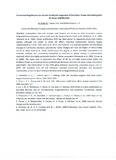Abstract:
Microbial communities (bacteria, archaea and viruses) are known to drive important marine biogeochemical processes, and as such form the basis of marine food webs (Whitman et al. 1998; Falkowski et al. 2008). Ocean acidification (OA) has been shown to negatively impact key marine species, although the extent to which OA affects microbial communities remains largely undetermined (Liu et al. 2010; Joint et al. 2011). For instance, it is unknown whether OA will induce changes in community structure, and whether these changes will have an impact on functionality (Liu et al. 2010; Joint et al. 2011). Furthermore, the degree to which microbial communities are resistant, resilient and functionally redundant in response to global change is understudied, especially within the highly productive Southern Ocean ecosystem (Mayewski et al. 2009; Turner et al. 2009). This study aims to determine the effect of OA on microbial communities within the Southern Ocean by simulating future predicted pH decreases (0.4 and 0.8 units), using a mesocosm experiment. The combination of 16S rRNA gene amplicon sequencing, enzymatic assays and RT qPCR, will elucidate how QA will influence microbial community structure and associated functionality, as well as what feedback this may have on biogeochemical cycling.

